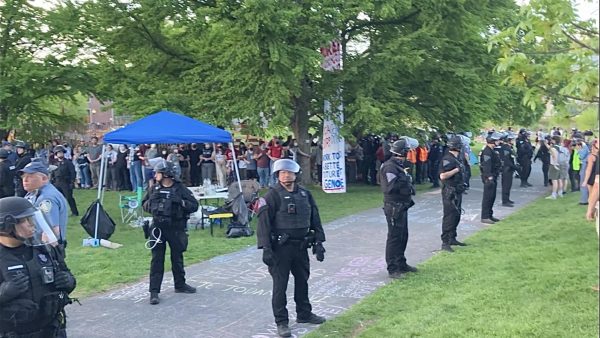Sleepless @ UMass offers solutions to the ‘collegiate sleep deficit’
AMHERST — Sleepless @ UMass, an event aimed to raise awareness on sleep deficits in college students, was held Wednesday afternoon in the Student Union.
Rebecca Spencer, an associate professor of psychological and brain sciences and the director of the graduate program in neuroscience, oversaw two tables at the event. One table showed off some of the technology her team regularly works with, while the other featured a 34-question survey students could complete to aid the program’s research.
Spencer has studied sleep for 12 years, and her team is trying to uncover causes and solutions for the sleep deficit amongst college students. Lately, her team has been using caps wired with electrodes to read the brain activity on sleeping test subjects at the new sleep lab in the Life Science Laboratory.
“The procedure helps to better visualize the different stages of sleep,” Spencer said.
Spencer said she theorizes that the problem with sleeping for students arises from “mismanagement and overworking.”
She explained that when faced with a choice of going to sleep or pulling an all-nighter to study for a fast-approaching exam, most students pick the latter even though being well-rested would give them a far greater advantage.
When asked what inspired Michelle Letendre, who works as a prevention specialist with the B.A.S.I.C.S. program on campus, to co-sponsor the event, she cited a 2007 study conducted by the American College Health Association. The study listed sleep difficulties as being number three of the top five health impediments to academic success. She said she intends to plan more programs and events in the future focusing on this issue.
Each of the tables at the event offered products, services, techniques or knowledge pertaining to getting a better night’s sleep.
A rush of people at the fair crowded around tables for free tea samples that claim to calm, relax and help people get to sleep. The tables set up by the Center for Health Promotion and The Tea Guy ran out of free sleep samples within the first 15 minutes, organizers said.
Pioneer Valley Reiki had a long line leading up to their demonstration. Reiki involves using touch to transfer energy into the body to help the brain initiate a relaxing response. The organization, which operates as part of the Sanctuary Healing Arts Center on Pulpit Hill Road, teaches the practice to people of all experience levels.
Another popular feature of the event was free acupuncture provided by University Health Services. They offered auricular acupuncture, which involves inserting needles into specific nerve endings in the ear, which is supposed to influence different parts of the brain, and thus the body. The sessions last 15 minutes, and future appointments can be made through the University Health Services specialty clinic.
Sun and Moon Originals advertised their meditation and yoga cushions at their table. The meditation cushion is based on traditional Japanese zafu cushions, with a redesign that aims to allow for a more comfortable lotus position.
The Young Living table was run by Amy Wasserman. The product advertised was a premium box set which included a diffuser and 11 oils, each claiming to have different health benefits. The product functions like a humidifier but with the purpose of spreading aromas rather than moisture.
Bed Bath and Beyond had a table stacked with special pillows, air purifiers and sleep aids. The table also offered a raffle for students to win a Bluetooth speaker.
For students like UMass junior Jonathan Conteras, the fair provided useful products and tips to improve sleep. Conteras regularly dedicates himself to getting a solid night’s sleep, earning the self-proclaimed title of “crazy sleep guy.” He prides himself on averaging eight to nine hours of sleep a night and using a smartphone app to track his sleep data.
Based on a study conducted by the University of Georgia’s Health Center, the average college student sleeps six to seven hours a night, which is under the recommended amount of time students should sleep. Michelle Letendre said that the goal of this event was to “raise awareness and academic support.” She said she hopes future events will cement this cause.
Conteras implied that the university could be doing things differently to be sure students get a better night’s sleep. For example, he expressed displeasure with the hallway lights in his dorm lacking a dimming feature during later hours. He wished the fair addressed more intimate and direct issues like dorm environments.
In the meantime, the “crazy sleep guy” walked away with goodies that will help him get a better night’s sleep.
Email Parker at [email protected].






